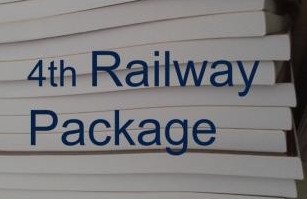TOWARDS AN AMBITIOUS AGREEMENT ON THE 4TH RAILWAY PACKAGE
The cost and efficiency of transport services and the quality of Europe’s infrastructure networks directly affect trade flows, mobility and the competitiveness of European companies providing and using these services.
flows, mobility and the competitiveness of European companies providing and using these services.
- In this context, BUSINESSEUROPE strives to remove technical, regulatory and administrative barriers in all modes of transport and improve the interoperability between national networks.
- In order to establish a Single European Railway Area as envisaged in the European Commission’s 2011 White Paper on Transport, regulatory and technical barriers to entry, market failures and burdensome administrative procedures in the rail sector need to be addressed decisively.
- Rail is an essential element for increasing mobility in the next decades and at the moment the modal share of rail, despite previous Railway Packages, has remained relatively modest1, partly due to obstacles to market entry hampering competition and innovation needed to improve and attract customers.
- BUSINESSEUROPE generally supports the 4th Railway Package as it contains important proposals to improve quality, provide more choice and reduce costs of railway services in Europe. Moreover, it can contribute to achieve a better functioning and more competitive single market.
- Europe must cut bureaucracy in authorisation procedures for rail technology. Efficient technical and administrative authorisation processes are a decisive factor for the further development of rail transport in Europe. To reach this goal it must be priority to finalise the technical pillar of the 4th Railway Package.
- We stress again that better implementation of former Railway Packages is fundamental to address many of the outstanding challenges, such as diverse national requirements and to ensure access of foreign rail freight providers tonational networks, as well full implementation of the interoperability and safety Directives.
- Furthermore, ensuring maintenance, upgrade and development of infrastructures through the Connecting Europe Facility (CEF) or other European and national instruments – also in rail – is fundamental for Europe’s competitiveness and ability to compete with other parts of the world. European interoperability should be guaranteed for any new investment, including where cost-benefit analysis is positive the elimination of the problem of different rail gauges between EU members, and should receive priority in the allocation of CEF.
- The proposal for a Regulation on European Fund for Strategic Investments (EFSI) might be an extraordinary opportunity for the deployment of large scale technological projects with European added value in the railway sector such as the European Rail Traffic Management System (ERTMS), in line with the competitiveness objective of the 4th Railway Package.
- Infrastructure investment is key, but not alone sufficient to realise the potential of passenger and freight transport via rail. This also requires structural changes to boost operational efficiency and service quality through more robust and transparent governance and market opening.
Readed: 1344









